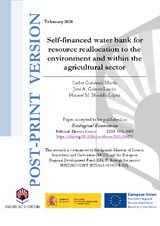Self-financed water bank for resource reallocation to the environment and within the agricultural sector
Autor
Gutiérrez-Martín, Carlos
Gómez-Limón, José A.
Montilla-López, Nazaret M.
Editor
ElsevierFecha
2020Materia
Hydrological droughtAllocation trade
Environmental flows
Economic efficiency
Mathematical programming
Spain
METS:
Mostrar el registro METSPREMIS:
Mostrar el registro PREMISMetadatos
Mostrar el registro completo del ítemResumen
In closed river basins, economic activities commonly threaten instream flows, especially during drought episodes. In such situations, a suitable policy option is to recover water for the environment by purchasing water allocations from farmers through a water bank. However, the purchase of temporary water rights strongly depends on the public budget available for this purpose. We propose a self-financed water bank with the twofold objective of reallocating water within the agricultural sector and recovering a share of the purchased water for the environment. The main feature of this water bank is that it will operate in a monopsony-monopoly setting, using its market power to recover water for environmental purposes, and working with a balanced budget (expenditure on purchases will equal revenues from sales). A mathematical programming model is developed to simulate the potential performance of the proposed water bank in the Guadalquivir River Basin (southern Spain), considering society’s demand for environmental water and different water scarcity scenarios. Results show that a maximum of between 5.8% and 10.4% of total water availability can be recovered for the environment, depending on the severity of the drought, while total economic efficiency is increased, yielding a beneficial result for farmers and society.

